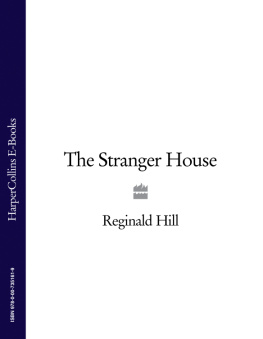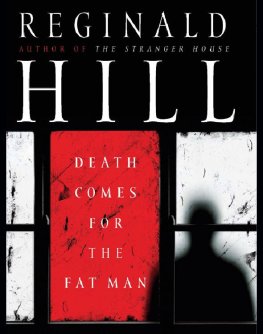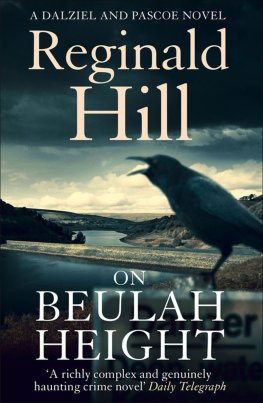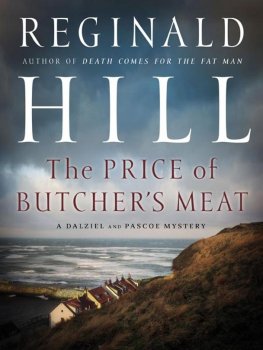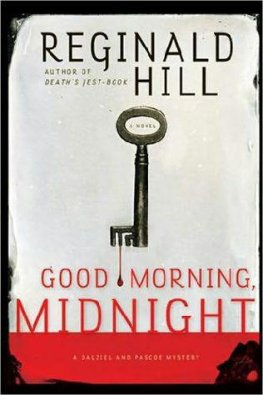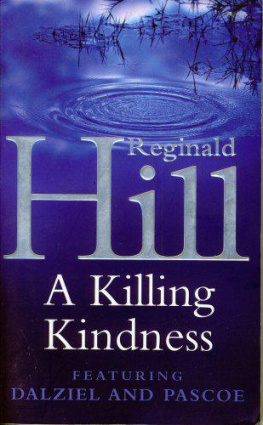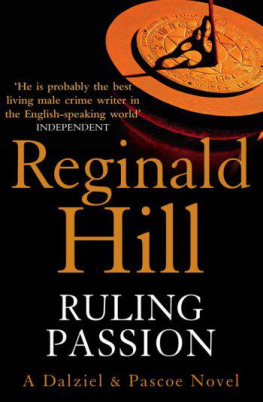Reginald Hill - Recalled to Life
Here you can read online Reginald Hill - Recalled to Life full text of the book (entire story) in english for free. Download pdf and epub, get meaning, cover and reviews about this ebook. genre: Detective and thriller. Description of the work, (preface) as well as reviews are available. Best literature library LitArk.com created for fans of good reading and offers a wide selection of genres:
Romance novel
Science fiction
Adventure
Detective
Science
History
Home and family
Prose
Art
Politics
Computer
Non-fiction
Religion
Business
Children
Humor
Choose a favorite category and find really read worthwhile books. Enjoy immersion in the world of imagination, feel the emotions of the characters or learn something new for yourself, make an fascinating discovery.

- Book:Recalled to Life
- Author:
- Genre:
- Rating:5 / 5
- Favourites:Add to favourites
- Your mark:
- 100
- 1
- 2
- 3
- 4
- 5
Recalled to Life: summary, description and annotation
We offer to read an annotation, description, summary or preface (depends on what the author of the book "Recalled to Life" wrote himself). If you haven't found the necessary information about the book — write in the comments, we will try to find it.
Recalled to Life — read online for free the complete book (whole text) full work
Below is the text of the book, divided by pages. System saving the place of the last page read, allows you to conveniently read the book "Recalled to Life" online for free, without having to search again every time where you left off. Put a bookmark, and you can go to the page where you finished reading at any time.
Font size:
Interval:
Bookmark:
Recalled to Life
Reginald Hill
Golden Age
ONE
I tell thee that although it is a long time on the road, it is on the road and coming.' It was the best of crimes, it was the worst of crimes; it was born of love, it was spawned by greed; it was completely unplanned, it was coldly premeditated; it was an open-and-shut case, it was a locked-room mystery; it was the act of a guileless girl, it was the work of a scheming scoundrel; it was the end of an era, it was the start of an era; a man with the face of a laughing boy reigned in Washington, a man with the features of a lugubrious hound ruled in Westminster; an ex-Marine got a job at a Dallas book repository, an ex-Minister of War lost a job in politics; a group known as the Beatles made their first million, a group known as the Great Train Robbers made their first two million; it was the time when those who had fought to save the world began to surrender it to those they had fought to save it for; Dixon of Dock Green was giving way to Z-Cars, Bond to Smiley, the Monsignors to the Maharishis, Matt Dillon to Bob Dylan, l.s.d. to LSD, as the sunset glow of the old Golden Age imploded into the psychedelic dawn of the new Age of Glitz. It was the Year of Our Lord nineteen hundred and sixty- three, and it is altogether fitting that this crime of which we speak should have been committed in one of Yorkshire's great country houses, Mickledore Hall, and that its denouement should have taken place in that most traditional of settings, the Old Library The library door burst open. A man came running out. For a second he paused. The main doors stood ajar, spilling golden sunlight across the old flagged floor. He took a half step towards the light, a voice called, 'Get him!' and he turned and started up the broad sweeping staircase. He was beautifully balanced, with the tapering figure of an athlete, and his long, easy stride devoured three treads at a time. A second man came out of the library now, almost as tall as the other, but dark where he was fair, burly and muscular where he was rangy and loose-limbed. He too glanced at the sunlit doorway for a moment. Then with unhurried pace he began to climb the stairs, taking one at a time, heavy lips pulled back from yellowing teeth in the anticipatory rictus of a hungry bear. On the first-floor landing the fleeing man turned right without hesitation, then right again into the first room he reached. Moments later the burly man arrived in the doorway. The room led through into another, through whose open door a double bed was visible. The fair man made no effort to go any further but stood defiantly by a huge mahogany wardrobe, his shoulders tensed for battle. 'Nay, Sir Ralph, no more laking. Your fancy woman's waiting.
Murder's one thing, but you'll not want accused of bad manners too.'
'What would a neanderthal like you know about manners?' sneered the fair man. 'You're dead right. Pig ignorant, that's me. This'd be what you call a dressing-room, is it? I'll take your word for it, though a dressing-room don't seem right to me without mud on the floor and a pile of old jockstraps heaving in the corner.' As he spoke the burly man was moving slowly forward. Suddenly reacting to the danger, the other seized a linen basket which stood by the wardrobe and raised it high as if to hurl it. The top came off, spilling items of male clothing over his head and shoulders. 'Trying to make me feel at home, Sir Ralph? That's right good of you,' the burly man said, grinning.
This gibe finally broke the other's control. Screaming with rage, he flung the wardrobe door open to impede the burly man's approach and started dragging clothes off their hangers and hurling them like palms before the advancing feet. Chunky tweeds, elegant evening wear, wool, cotton and finest silk, all alike were crushed beneath that implacable tread till finally the two men stood inches apart. A hand like a contractor's grab fell upon the fair man's shoulder. Instantly, as if its touch were anaesthetic, all life and energy seemed to drain from his limbs and the tense straining body went slack. 'Walkies,' said the burly man. At the foot of the stairs, an older grey-haired man with a lantern jaw was waiting. 'Well done, lad,' he said. 'Shall I cuff him, sir?' 'I doubt we'll need to go as far as that, though if he gives any more bother, you can mebbe box his ears.' The burly man laughed. The old jokes were best, especially when your boss made them. Outside, the sun was low in the sky but still warm. It cast long shadows from the three police cars standing on the white gravel beneath the terrace. In the rearmost car's shady interior the pale face of a woman could be seen, wedged between two WPCs. She looked straight ahead, showing no more animation than a death mask. The uniformed officers took charge of the fair man and led him down from the terrace into the second car.
He turned before he got in and looked back, not at the figures above him, but at the house itself, his gaze moving slowly along the whole facade. Then he let himself be pushed into the rear seat. On the terrace the man with the jaw spoke a few words to his burly subordinate before running lightly down the steps and getting into the leading car. He held his arm aloft through the open window, like a waggon master preparing his train. Then he let it drop forward, the cars began to crunch gravel, and at the same time their bells started to sound and their lights to flash. Smiling broadly, the burly man stood on the terrace till he could no longer see the flashing lights nor hear the sounding bells. Then he turned his back on the sun and slowly re-entered the house.
TWO
'You can bear a little more light?' 'I must bear it if you let it in.' Lights. Some hot, harsh and constant. Others driven at her like snow against a stove-pipe, melting soon as touching. A shallow platform, one step up. She takes it, pauses, sways, hears the pause and the sway in the watcher's breath. She thinks: So it must have felt for Mick, that first step on to the scaffold. A hand steadies her. No executioner's hand, but her saviour's. Jay's, cousin Jay Waggs, though she cannot yet think of him as saviour. She clutches her old leather-bound Bible to her skinny breast. He smiles at her, a warm smile in a young face, and a memory is touched of faraway times, faraway places. He urges her forward. There is a chair. She sits. To her left, a pitcher of water with a glass. To her right, a small vase out of which a spray of freesia raises its hand of glory. Before her, a posy of microphones offering some protection from the flashing bulbs and probing gazes but none from the TV cameras covering her every move, like guns on a prison watch- tower. Mr Jacklin is speaking. Her solicitor. A small grey man who looks so dry that a very little pressure might crumble him to dust. But it is a dryness which kindles to fire at the spark of injustice. He says, 'Let me rehearse the situation in case anyone has strayed in from another planet. My client. Miss Cecily Kohler, was tried for the murder of her employer, Mrs Pamela Westropp, in nineteen sixty-three. She was found guilty and sentenced to death. The sentence was later commuted to life imprisonment. Almost from the start, doubts were expressed in some quarters about the safeness of the verdict, but circumstances conspired to make a reexamination of the case virtually impossible until, two years ago, Miss Kohler's kinsman, Jay Waggs, began to interest himself in the fate of his distant kinswoman, Cissy Kohler.
The new evidence he uncovered was first presented to the public in the Ebor television programme Doubt last spring. Now the Home Secretary has at last accepted that there are serious grounds for believing there may have been a gross miscarriage of justice and he has issued a release order pending consideration of the new evidence by the Court of Appeal. 'Until the decision of that court is officially made public, I cannot of course comment on the legal implications of what has happened. But I can point out the obvious. My client has spent a longer period in jail than any other woman in the annals of English penology. It goes without saying that she will need a proportional period of readjustment to the rigours of freedom. But being aware of the great public interest in the case, she has accepted the recommendation of her advisers that she should attend this press conference in the hope that thereafter she will be permitted a long breathing space free from the importunities of the media.' 'Does that include Jay Waggs and Ebor television?' calls a sharp-faced young woman. Jay Waggs smiles at her and says, 'One question per paper was the agreement. Is that yours, Sally?' 'No! Miss Kohler, I'm Sally Blindcrake, Daily Sphere. How did it feel when you heard you were getting out?' Cissy Kohler speaks so softly not even the posy of mikes can pick it up. 'Sorry? I couldn't catch that.' 'She says she felt nothing,' says Waggs. 'Next question.' 'Nothing?' insists Blindcrake incredulously. 'After all those years you're told you're innocent, and you feel nothing?' Kohler raises her head and speaks again, this time loud enough to be heard. 'I knew it already.' A pause, then laughter, a ripple of applause. 'Next,' says Waggs. 'Martin Redditch, BBC television. Miss Kohler, you didn't apply for parole until nineteen seventy-six, though you could have applied earlier. Why was that?' She frowns and says, 'I wasn't ready.' 'Ready for what?' shouts someone, but Redditch is pressing on, regardless of the one question limit.
Font size:
Interval:
Bookmark:
Similar books «Recalled to Life»
Look at similar books to Recalled to Life. We have selected literature similar in name and meaning in the hope of providing readers with more options to find new, interesting, not yet read works.
Discussion, reviews of the book Recalled to Life and just readers' own opinions. Leave your comments, write what you think about the work, its meaning or the main characters. Specify what exactly you liked and what you didn't like, and why you think so.

